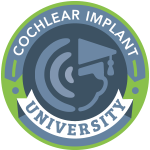Orientation
Orientation provides a good opportunity for you to meet your fellow students, learn more about your school, and kick-off your college career. You should prepare ahead of time, but also remember to enjoy yourself.
Your first event as a new college student will be orientation. Here are a couple things you can do to get the most out of orientation. Check the Resources section for some examples to help you get started on these tasks.
At home, before you get to school:
- Practice dialogues about how to tell other new students about cochlear implants.
- Ensure that the Office of Disability Services received documentation of your hearing loss and that they have all of the paperwork they need to secure your accommodations. You may also want to print out or get a copy of documentation of your hearing loss to take with you to orientation.
- Find out where orientation sessions are held, then email the Office of Disability Services to arrange accommodations for various orientation session locations, particularly ones that are large, noisy spaces.
- Create a list of questions to ask your orientation leaders.
- Connect with your roommate(s) ahead of time to see if you can plan sessions together.
- Research whether your school has any clubs for students with cochlear implants or hearing loss, so you can connect with them at orientation.
- Plan a visit to the Office of Disability Services to check-in about accommodations.
At school, before orientation:
- Arrive a day or two early to familiarize yourself with the campus and surrounding area.
- Plan a visit to the Office of Disability Services.
Orientation is chaotic and busy and your surroundings will likely be noisy. A little preparation may help you feel less overwhelmed. Write down questions as you think of them in the days leading up to orientation.
Orientation can be overwhelming for anyone, however, it is packed full of useful information to help you make a smooth transition to college.
Here are a few tips to make the most of your orientation:
- Visit the Office of Disability Services. This will help the office put a face to your name when you request accommodations. This is a good time to check-in to make sure everything is set for your accommodations.
- Locate the academic learning center, language skills center, and computer center. Many institutions have computer centers with adapted hardware and software that are valuable learning tools.
- Try not to rely on your parents too much during orientation, particularly for accommodations. Remember that you will be your own advocate in college.
- Take notes, if needed. There’s a lot of important information to remember, but with everything going on, you may forget.
- Take advantage of the social events like ice cream socials and team games. This can help you meet other students.
- Speak with upper-class students in charge of student involvement. These students can give you advice on social clubs and any clubs or activities for students with cochlear implants or hearing loss.
- Make sure to get the contact information for the advisors who help you during orientation. It is likely that you will have follow up questions to ask them.
- Take advantage of social media to make connections with people you meet at orientation.
Taking full advantage of your orientation as it can help you start college feeling more self-confident, informed, and ready to focus on learning.
During orientation, you may have to explain your cochlear implants and hearing needs to people multiple times.
When explaining your hearing needs to other students:
- Explain that you have cochlear implants and how they affect your hearing.
- Explain what other students can do to help reduce communication challenges.
When explaining your hearing needs to orientation leaders:
- Explain that you have cochlear implants and how they affect your hearing.
- Before a session begins, approach an orientation leader and explain what they can do to help you understand the session better. For example, you can ask them to face the group as much as possible or ask to sit in a preferred location.
- If you are intimidated about asking questions related to your hearing needs in a large session, ask orientation leaders if you can set up a meeting with them separately.

